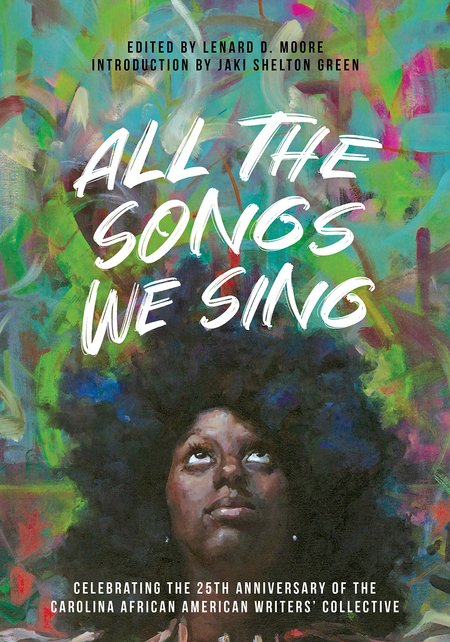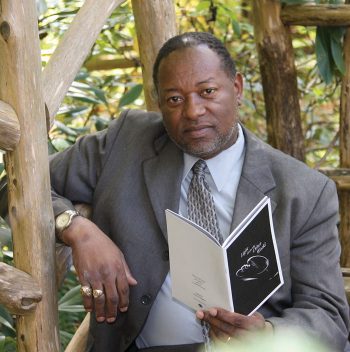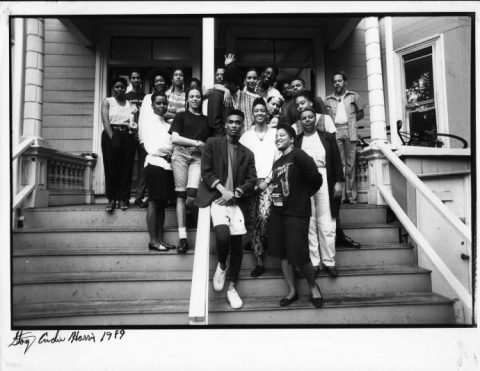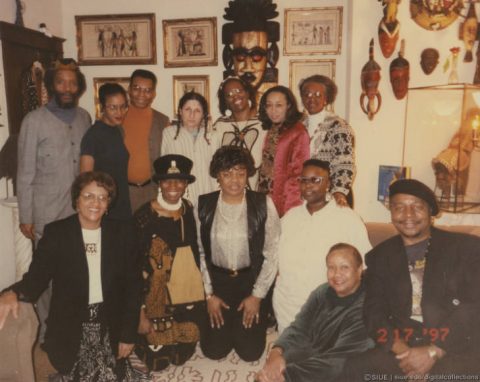This content is being reviewed in light of recent changes to federal guidance.
Book Review: “All the Songs We Sing: Celebrating 25 years of the Carolina African American Writers’ Collective”
Unzueta, Victoria Garcia; Savannah, Simone. "Book Review: “All the Songs We Sing: Celebrating 25 years of the Carolina African American Writers’ Collective”." History of Black Writing, https://hbw.ku.edu/blog/book-review-all-songs-we-sing-celebrating-25-years-carolina-african-american-writers. Accessed 3 Apr. 2025.
“All the Songs We Sing” celebrates the 25th anniversary of The Carolina African American Writers’ Collective, which began in 1995 as a group where aspiring Black authors could come to have their work peer reviewed. The history of writer’s collectives stems back decades, starting most notably with the South Side Writer’s Group, which was founded by Richard Wright in 1936 and was made up of writers such as Arna Bontemps and Margaret Walker. The South Side Writers Group helped Wright publish the “Blueprint for Negro Literature” an essay in which Wright wrote about the role of African American writers in the collective consciousness of African Americans. For decades, writer’s collectives have created a space for Black writers to share their work, build their skills, and create a community which has helped in the publication of countless Black literary works.

All the Songs We Sing celebrates the Collective’s 25th anniversary. Lenard D. Moore, the founder, desired to create a Black writing movement that focused on cultivating craft and voice. He had taken a poetry workshop where he and other Black students had to constantly explain cultural and historical references in their poems. The goal of The Carolina African American Writers’ Collective “was not to make our story palatable to those who didn’t understand it. It was simply to tell it, the way that was uniquely our voice.”
The poems explore Black womanhood and girlhood, place and nature, history and memory, pain and abuse. They are written in free verse, sonnets, and haikus. Poems such as Moore’s “Interrogation of Harriet Tubman.” where he writes about the complicated choice to escape slavery, reach back in time and speak to ancestors. Fearing leaving children behind to be “snatched and sold,” the speaker asks Tubman difficult questions:
“Will I ever see them again?”
“What am I going to eat?”
“Can you tell me what’s waiting for us/in the thicker?”
Poems like “When I Consider the Open Casket” by Kim Arrington and “Because of Emmett Till” by Diane Judge route readers through a racist American history, and rebirth Emmett, a Black child who was hunted and murdered by white men in Mississippi. The poems are deliberate in retelling history as well as meditating about the personal. In “A Few Years In,” readers get a glimpse into a reflective moment about love and closeness:
“When I squeeze too tight
she never pushes back
like she needs room”
The fiction and creative nonfiction featured in the anthology also showcase the writers’ abilities to write across genres as they pull readers into their political and social realities. The stories explore loss and grief, choices surrounding motherhood, and food and community.

PC: Salisbury Post
The weaving of the historical and the personal emphasizes the complexity of the writers and the purpose of the Collective to craft poems that speak to their experiences as Black people in the Carolinas and beyond. As Jaki Shelton Green writes in the foreword, the anthology demonstrates “the urgency of protecting the agency of Black voices that reflect our people, politics, social conditions, and subject matter that should be a catalyst for engagement. The poetry, fiction, and nonfiction assist in constructing a “diverse and energetic” literary landscape where the writers magnify experiences through various devices, including metaphor, orality, and vernacular – the songs of these writers come together as a beautiful and complex ensemble. Readers encounter an array of language and experience bridging memoirs, essays, and poems that push them to think consciously and critically.
In the afterword, Lauri Scheyer reflects on All The Songs We Sing as a “re-collection and re-assessment” of a literary family. She writes, “these writers have sprung forward from and are influenced by this shared and hallowed soil” (192). This collection is undoubtedly a reunion of talented Black writers that honors their craft and contributions to American Literature.
The anthology features poetry, fiction, and nonfiction by Kim Arrington, Dr. L. Teresa Church, Camille T. Dungy, Fred Joiner, Angela Belcher Epps, Bridgette A. Lacy, Sheila Smith McKoy, Carole Boston Weatherford, Evie Shockley, Crystal Simone Smith, L. Lamar Wilson, and Gideon Young.
More Writer’s Collectives

The Harlem Writers Guild is the oldest continuously operating Black writer’s guild in the world. It was established in 1950 as a forum where African American writers could develop their craft and continues to be a place of community for Black writers.
The Dark Room Collective was founded in Boston in 1988 and was led by Thomas Sayers Ellis and Sharan Strange. It was originally a reading series but became a community of established and emerging African American poets and writers.
Eugene B. Redmond Writers Club

PC: Southern Illinois University Edwardsville
The Eugene B. Redmond (EBR) Writers Club was founded in East St. Louis in 1986. The club has coordinated a workshop for writers for over thirty years now. Members of the club have collaborated on a variety of arts programming, including poetry performances, teaching sessions, an annual Kwanzaa event. The EBR Club also co-produced the arts journal Drumvoices Revue.